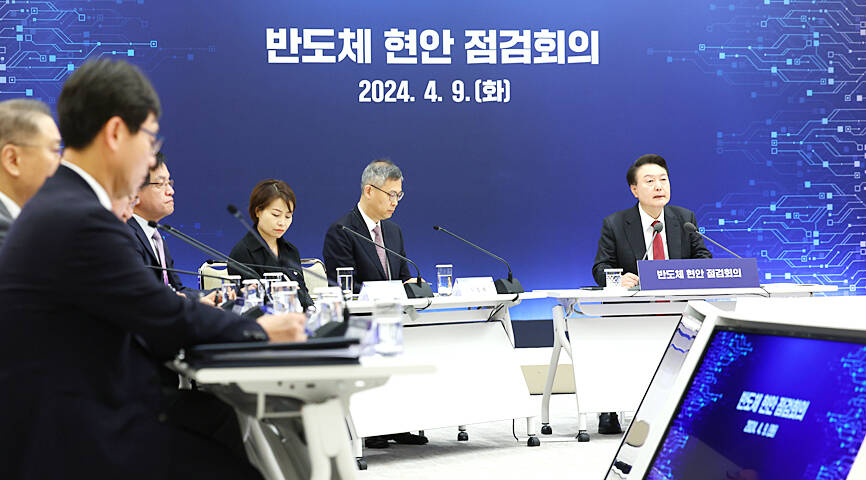South Korea plans to invest almost US$7 billion in artificial intelligence (AI) by 2027 in an effort to become a global leader in cutting-edge semiconductors, South Korean President Yoon Suk-yeol said yesterday.
The country is home to Samsung Electronics Co and SK Hynix Inc — the world’s top two makers of memory chips, including the premium high-bandwidth memory (HBM) used in the hardware that powers AI.
The semiconductor industry is a crucial pillar of South Korea’s export-driven economy, and Yoon told a high-powered meeting of officials and tech sector executives that his administration wants the country to lead the world in AI chips.

Photo: EPA-EFE
“It is no exaggeration to say that the future of the semiconductor industry depends on AI,” his office quoted Yoon as saying.
“We will invest 9.4 trillion won [US$6.94 billion] in the AI and AI semiconductor fields by 2027,” and set up a separate 1.4 trillion won fund “to help the growth of innovative AI semiconductor companies,” he said.
Representatives from Samsung, SK Hynix, tech giant Naver Corp and AI chip start-up Sapeon Inc attended the meeting, Yoon’s office said.
Motivated by geopolitical concerns surrounding Taiwan and the larger US-China rivalry, Seoul and Tokyo are vying with Washington and major European nations to boost domestic chip production with massive investment and subsidies.
The AI chip market is currently dominated by Silicon Valley titan Nvidia Corp, to which SK Hynix supplies HBM chips.
South Korea aims to become a world leader “in AI technology and go beyond memory chips to conquer the future AI chip market,” Yoon told the meeting. “The semiconductor competition taking place now is an industrial war and an all-out war between nations.”
Semiconductors are South Korea’s leading export. Outbound shipments last month hit US$11.7 billion, the highest level in almost two years and one-fifth of South Korea’s total exports, South Korean Ministry of Trade, Industry and Energy figures showed.

When an apartment comes up for rent in Germany’s big cities, hundreds of prospective tenants often queue down the street to view it, but the acute shortage of affordable housing is getting scant attention ahead of today’s snap general election. “Housing is one of the main problems for people, but nobody talks about it, nobody takes it seriously,” said Andreas Ibel, president of Build Europe, an association representing housing developers. Migration and the sluggish economy top the list of voters’ concerns, but analysts say housing policy fails to break through as returns on investment take time to register, making the

‘SILVER LINING’: Although the news caused TSMC to fall on the local market, an analyst said that as tariffs are not set to go into effect until April, there is still time for negotiations US President Donald Trump on Tuesday said that he would likely impose tariffs on semiconductor, automobile and pharmaceutical imports of about 25 percent, with an announcement coming as soon as April 2 in a move that would represent a dramatic widening of the US leader’s trade war. “I probably will tell you that on April 2, but it’ll be in the neighborhood of 25 percent,” Trump told reporters at his Mar-a-Lago club when asked about his plan for auto tariffs. Asked about similar levies on pharmaceutical drugs and semiconductors, the president said that “it’ll be 25 percent and higher, and it’ll

CHIP BOOM: Revenue for the semiconductor industry is set to reach US$1 trillion by 2032, opening up opportunities for the chip pacakging and testing company, it said ASE Technology Holding Co (日月光投控), the world’s largest provider of outsourced semiconductor assembly and test (OSAT) services, yesterday launched a new advanced manufacturing facility in Penang, Malaysia, aiming to meet growing demand for emerging technologies such as generative artificial intelligence (AI) applications. The US$300 million facility is a critical step in expanding ASE’s global footprint, offering an alternative for customers from the US, Europe, Japan, South Korea and China to assemble and test chips outside of Taiwan amid efforts to diversify supply chains. The plant, the company’s fifth in Malaysia, is part of a strategic expansion plan that would more than triple

Taiwanese artificial intelligence (AI) server makers are expected to make major investments in Texas in May after US President Donald Trump’s first 100 days in office and amid his rising tariff threats, Taiwan Electrical and Electronic Manufacturers’ Association (TEEMA, 台灣電子電機公會) chairman Richard Lee (李詩欽) said yesterday. The association led a delegation of seven AI server manufacturers to Washington, as well as the US states of California, Texas and New Mexico, to discuss land and tax issues, as Taiwanese firms speed up their production plans in the US with many of them seeing Texas as their top option for investment, Lee said. The